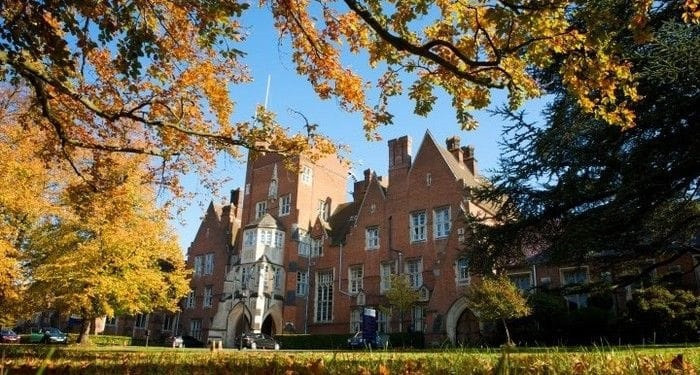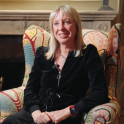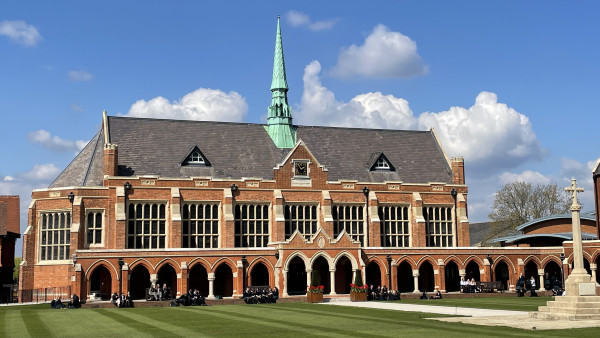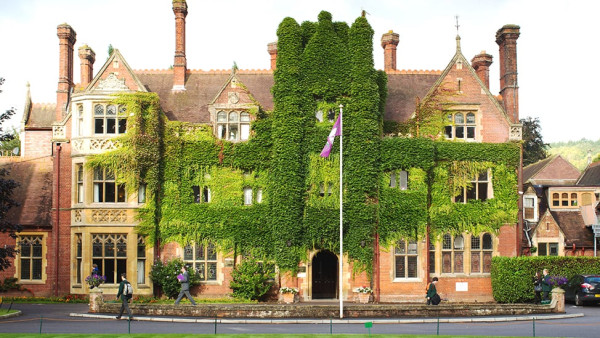‘You feel you’re part of a school that’s really going places – a bit like what it was like at Wellington 15 years ago,’ said one parent. This school offers an exciting learning environment within an extensive, top-notch campus and the students are among the most inquisitive and delightful we’ve come across.
Why read our school review?
Unlike other websites, schools can't pay to be included in The Good Schools Guide. This means our review of this school is independent, critical and fair, and written with parents' best interests at heart.
Overview & data
- Pupil numbers
- 1,100 ·
- Sixth form numbers
- 320 ·
- Offers boarding
- Yes ·
- Religion
- None
- Fees
- Day £28,443 - £36,468; Boarding £48,852 - £55,158 pa
- Local authority
- Surrey County Council
Headteacher
Head
Mark Lascelles
Since September 2024, Mark Lascelles, who previously spent 12 years as head of Dauntsey’s School, a place where he thought he would finish his teaching career: ‘I had not been looking for a move, however the opportunity of leading Epsom is too tempting to pass up.’ He also spent three years at the King’s School, Canterbury, two as lower master and one as the acting head, as well as 17 years at Shrewsbury School as geography teacher, coach for the first football, cricket and fives teams, and boarding housemaster.
Entrance
School is after all-rounders with several strings to their bow and fair share of the bright students. No longer a second-choice regular, the school is increasingly a bill-topper, recruiting from over 40 preps and state schools, likely to increase as it extends reach (Danes Hill, Downsend, Shrewsbury House, Aberdour and Feltonfleet feature prominently though no official feeders).
At 11+, entry via maths, English and VR tests plus interview in January of year 6. Second intake into year 9, with January pre-test in year 6 (VR - scores of around 118-120 the norm).
If no joy at 13+, small number of places at 14+ (three to five only; English, maths and VR tests). Second biggest influx is post-GCSE with 45 joining the sixth form, following VR, NVR and numerical skills tests plus interview. Students at this stage need minimum of seven GCSEs with at least grade 6, and a minimum of grade 7 in their chosen A level subjects (or 8 for more technical subjects like maths, science and modern foreign languages).
- Open days
- September, March, June
Exit
Fewer than 10 students (often none) leave after GCSE; school feels it has a ‘moral obligation to take them all the way through’. Vast majority to university and of those 70 per cent to Russell Group. No shortage of ambition, most achieving first-choice universities - UCL, Nottingham, Exeter, Bath, Durham, Imperial and St Andrews all popular in recent years. Sometimes double figures of medics and a few to Oxbridge. Lots overseas, most recently to the Sorbonne, UHK, several American universities, Canada and Switzerland.
Latest results
In 2024, 83 per cent 9-7 at GCSE; 63 per cent A*/A at A level (88 per cent A*-B).
% of pupils achieving AAB or higher, including at least 2 facilitating subjects (2024)
What is this?
Facilitating A levels are ones that are commonly needed for entry to leading universities. They are: biology, chemistry, physics, mathematics, further mathematics, geography, history, English literature and classical or modern languages. The % of pupils achieving AAB or higher may therefore decrease if many pupils have opted not to take two or more of the facilitating subjects mentioned.
Teaching & learning
One of the formerly mid-ranking schools to have substantially upped their game, Epsom retains a prevailing sense of progression. Data and pupil intervention have nudged their way up the priority ladder, with subtle testing carried out every three weeks, which appears to be tackling underperformance and ensures no report ever has any surprises for parents. Meanwhile, more layers in the academic management team have focused minds on more engaging teaching (‘though some teachers still give boring lessons,’ one student told us).
Selective to a degree, but with breadth of intake, staff have to pass muster in proving they can teach a range of abilities, ‘which ultimately means having a range of strategies at their fingertips to capture all hearts and minds, not just teaching to the top end,’ says school. Innovative approach to CPD, with staff not sent off on courses (‘generally winds up being a bit of a jolly’) but instead invited to pick from half-hour power-learning sessions, which they then have to prove they’ve linked to their teaching. ‘All teachers here know they have to work on their craft,’ says school.
Though class sizes have grown – average 23 for GCSE and 16 max at A level – school is consistently good when it comes to value added (it’s in the top two per cent in the country), with banding in languages (all do French, Spanish, German and Mandarin from year 7 then pick one, ideally two, for GCSE when Latin and Greek also become available) and setting in maths and science (where small group of less able students might do GCSE dual sciences rather than IGCSE triple – although not enough for students’ liking, it seems, with one telling us, ‘some of my friends absolutely hate science and find it so confusing yet were told they have to do triple’).
Most do 10 GCSES and, in sixth form, three A levels (75 per cent also do EPQ). Results generally very good given relatively mixed intake. Largely traditional subject range, almost ology-free. Maths, science, art and PE do well at GCSE and art, sciences, economics and business studies are the dazzlers at A level.
Plenty of emails and reports to parents ensure that everyone is kept informed, although one parent told us ‘one parents' evening a year, which is always a bit rushed, seems a bit on the mean side’ (school says there are numerous evenings each year, but not all called parents' evenings – information evenings, choices evenings etc). Lengthy school day (lessons start at 8.20am, finishing at 6pm for seniors) incorporates sufficient free periods for the organised to get their homework out of the way (‘good preparation for using time sensibly at university,’ says school).
Students are challenged but not pressured, say parents. One told us, ‘My son was skimping on his revision at one point – he got a bit lazy really - but the housemaster took him aside and said, “Look, you’re a clever boy, don’t blow it” and it worked a treat.’ Other parents like how the school doesn’t ‘steer them in a direction that doesn’t suit them – a child doesn’t want to go to university, they are fine with that’.
Careers advice could be better, feel parents, with one student telling us about a ‘very uninspiring’ careers aptitude test ‘that told my friend she should be a librarian and me a maths teacher’. School points out there are ‘multiple workshops, evenings, societies, world of work evenings, careers fairs etc’.
- Qualifications taken in 2024
- A level
- BTEC
- EPQ
- GCSE
Learning support & SEN
Extra scaffolding where needed, with clinics in all key subjects and teachers not just present (many live in) but in many cases ‘always available’. Of the 140 or so pupils with SEN, SpLD is the overwhelmingly dominant need and all SEN is at the milder end. ‘They’ve managed our daughter’s extra needs very well,’ said a parent.
Arts & extracurricular
Music, drama and arts have a louder voice than in the past (at one time it was little more than a whisper, from what parents told us), thanks to former head pushing their weight. New head of music has introduced greater breadth so jazz, pop, classical, you name it, are all celebrated, with ‘extravaganzas’ every term. ‘Sometimes you see the ballet dancers from the lower school dancing with the 18-year-olds - not always on the money but they get the claps and that’s what it’s all about,’ previous head observed. There are junior and senior choirs (it’s cool to be in the choir here – ‘even the rugger buggers get stuck in’) and a strong orchestra (they get professional musicians to come and play with them to ‘ginger them up a bit’), plus all the usual ensembles. Drama ‘improving’, say parents, although school leaders want the ‘great culture of musical theatre that seems inevitable in co-ed senior schools’ to be balanced with some more serious acting. Art also attacked with relish, with lovely facilities and a university art school feel.
DofE prevalent. CCF feather in school cap – one of oldest and biggest in country. Clubs aplenty – we met one student who’d introduced a film club, another University Challenge. Everybody gets out a lot on trips or to matches – a fleet of minibuses awaited students when we visited. DT excursions to real factories (Mini to New Holland tractors) popular among staff and students.
Sport
Sport is successful; a previous head, who instigated a ‘quiet revolution’ by bringing in live-in sports graduates, was determined to up its game. Boys’ and girls’ rugby sevens regular regional winners, lots of post-school success too. Ditto hockey (girls' first XIs through to fourth XIs lost only two of their 40 games the season we visited). The word ‘unbeaten’ features widely but never with expectancy or smugness – in fact, school wears success surprisingly lightly: numerous impressive sports cups casually on display. Parents agree that ‘nobody is on the bench at Epsom’. Golf is strong – just over the fence is Epsom golf course; two students were recently awarded golf scholarships to US universities. Climbing popular; riding available off site. Facilities generous - two cracking sports halls, one giant sized, six squash courts, a swimming pool and a fencing salle, among others. Most recently, an Olympic-standard all-weather hockey pitch. But while rugby ‘is still king’ and this is a very sporty school, ‘you’re not penalised if you’re not really sporty and it is no longer a rugger bugger school,’ a student told us. ‘Sport is very important, whether you're A team or D/E/F team material,’ agreed a parent.
Boarders
Most boarders are weekly, but full boarding numbers aren’t far behind. Boarding houses, five in total (plus another eight day houses), are all dotted round the site and are spacious, colourful and homely. Kitchen in the girls’ boarding house we saw looked as if it had been taken straight out of a showroom, though a student told us that ‘certainly isn’t the case for all of them’, with ‘some houses much snazzier than others’. Dorms – on the small side and rarely with more than four beds – functional and with varying degrees of tidiness.
Sensible trouble-preventing measures include optional half-termly dorm swaps and plenty of weekend activities for full boarders, from trips to Thorpe Park to house evenings and bowling. Buddy system helps combat homesickness, while matrons (whose offices are welcoming and cosy) add much appreciated extra tea and sympathy layer. Students told us each house is very different, both in terms of feel and rewards such as town leave (at the discretion of the housemaster or housemistress), but all rules are the same.
Ethos & heritage
‘I thought it might be a bit stuck up, but it really isn’t,’ said a parent. Though patron was HM the Queen, we agree it’s definitely not a high-society institution. Altogether a very civilised place to be, though, with sprawling campus rich with lush green lawns and fields, buildings – most completed between 1850s and 1920s, with tasteful modern extensions – and imposing chapel at its heart (‘a place where you get a chance to be quiet and reflective, though services can be boring,’ admitted a student). Started life as the Royal Medical Benevolent College, a charitable Good Thing, helping the relatives of deceased impoverished medics. Modern additions – humanities building particularly palatable – don’t jar and there’s plenty of social areas for sixth formers. Lovely, spacious library – ‘I stay until 9pm some nights,’ an older boy told us.
Took only boys for the first 120 years or so (sisters presumably expected to marry their way to economic success); girls added in sixth form in 1976 then throughout the school in 1996. Now, of course, school wouldn’t be without them and the intake of year 7s in 2017 was 51 per cent girls – the first year they’d had more girls than boys in a class, though they remain minority partners in other years. Desired ratio (for now) is 45:55.
Pastoral care, inclusivity & discipline
‘If your child worries – which mine does – there is so much support available both in and out of the houses in terms of their emotional wellbeing,’ said one parent, although another told us she felt school isn’t for ‘the less robust child’. Generally speaking, pastoral care is ‘light touch’, says school, though behind-the-scenes monitoring ensures problems don’t get missed. Deputy head reeled off impressive lists of mental wellbeing speakers and workshops; form tutors, matrons and school counsellor tend to be first port of call for those seeking support. Seniors a strong force and take turns to lead assemblies and, as one student told us, ‘won’t tolerate seeing students picking on others’. Could be more freedom in sixth form, say some. ‘In upper sixth, there’s very little change in school life from earlier on and so the boys push against that when they’re 18,’ said one parent, but students told us it ‘really depends what house you’re in – some matrons are stricter than others’.
Little in the way of serious misbehaviour, with the odd student ‘withdrawn by parents’ (expulsion by face-saving euphemism). Two or three temporary exclusions per term, increasingly social media misdemeanours. Day to day, class silliness and late homework the main issues, reckon students, with escalating sanctions – lines, notification of tutors, warnings, departmental then school detentions. Lots of rewards, too – from pizza or chocolate for work-related merits and distinctions to privileges of seniority.
Following an ISI inspection in late 2021 highlighting failures in relation to safeguarding and the leadership and management of the school (three out of 23 national minimum standards), the school has addressed these issues and inspectors are now satisfied that standards are met.
Pupils & parents
‘You don’t get a lot of Ferraris and designer suits, put it that way,’ said a parent, using her barometer of wealth, though it’s fair to say families are well off (perhaps just not showy with it). Used to be predominantly local intake with vast majority of pupils, including 95 per cent of UK boarders, living within 10 to 15 miles – that’s now expanded to 25 miles, with more bus routes to cater for them. Many staff have own children here.
Cosmopolitan feel added by international component, although this has dropped from 20 to 15 per cent in recent years – a proactive measure as school not keen to lean too heavily on the international market: ‘We know that local parents don’t want their weekly boarders exclusively living with youngsters speaking another language.’ For those who are non-native English speakers there is a structured EAL programme in place, but they're fully integrated into the curriculum, says the school, 'right from day one'. Sister school opened in Kuala Lumpur in 2014 - first foray into pastures new, with all profits ploughed back into widening access back at Epsom College.
Money matters
Annual bursary spend just over £1m on up to 100 per cent of fees. Possible additional financial support for families with medical connections through the Royal Medical Foundation, based at the school, though since 2000 a separate legal entity. Scholarships for academic, sports and performing arts (drama and/or music) at all entry points.
- Fee information
- Day £28,443 - £36,468; Boarding £48,852 - £55,158 pa
The last word
‘You feel you’re part of a school that’s really going places – a bit like what it was like at Wellington 15 years ago,’ said one parent. This school offers an exciting learning environment within an extensive, top-notch campus and the students are among the most inquisitive and delightful we’ve come across.






